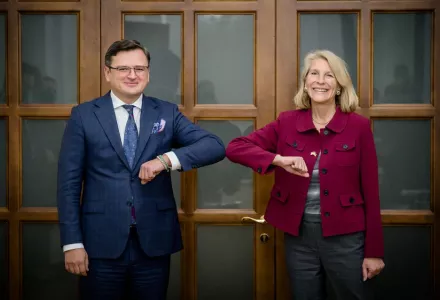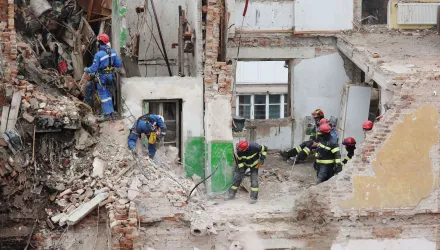Session 1 | February 21, 2024
Scene setter: The first session will provide general background on Russia’s full-scale invasion of Ukraine on February 24, 2022. What led to the invasion? What were Russia’s motives? What diplomatic actions did the Biden Administration take to avert the war? How unified was the transatlantic community? What has the trajectory of the war been over the past 24 months? What are the most relevant issues today for the outcome of the war? Dr. Donfried will be the speaker.
- We will also discuss the format for the other five sessions, including how to structure the debates.
Session 2 | February 28, 2024
First debate: NATO should invite Ukraine to join the Alliance at its 75th anniversary summit in Washington this July.
- The debate should address whether Ukraine has met the requirements for NATO membership and what the risk to NATO is of admitting a country which is involved in an active war with Russia.
Session 3 | March 6, 2024
Second debate: The United States, together with its partners, should confiscate sovereign Russian assets and hand them over to Ukraine for reconstruction in light of Russia's destructive war.
- The debate should address the merits of the EU, US, Japan, Canada, and others seizing the roughly $300 billion of Russian central bank assets that they froze in 2022 when Russia invaded Ukraine. Only about $5-6 billion are in the US, with most held in Europe. For the US, such action would represent the first-ever seizure of central bank assets from a country with which the US is not at war.
Session 4 | March 20, 2024
Third debate: The Biden Administration should provide Ukraine with any weapons (short of nuclear, chemical, or biological weapons) it requires to win the war.
- The debate should wrestle with whether the Biden Administration has been too concerned about the risk of escalation, thereby undermining Ukraine’s war effort. Critics of the Administration argue that fear of escalation has led the Administration to hold back on giving Ukraine the weapons it needs to win.
Session 5 | March 27, 2024
Fourth debate: The Biden Administration should pressure the Ukrainians to go to the negotiating table and resolve the dispute with Russia diplomatically.
- The focus of the debate is likely to be on Putin’s interest in diplomatic negotiations to end the war: Is he ready to compromise or is he only interested in Ukrainian concessions? Might the Chinese play a helpful role in pressuring Putin? Another key issue is the implications for U.S. leadership of appearing to sell out the Ukrainians.
Session 6 | April 3, 2024
Closing discussion: The last study group session will focus on the future: What is most likely to happen next and how might the war end? The implications of how the war ends will be considered not only for Ukraine, but also for NATO and for global order. Dr. Donfried will sum up the key takeaways.
- Students will be divided into small groups to discuss various trajectories the war could follow from negotiating a diplomatic settlement to continuing to fight. The staying power of Ukraine’s closest supporters, including the US, will be considered, along with the importance of the support Russia is receiving from China, North Korea, and Iran.



